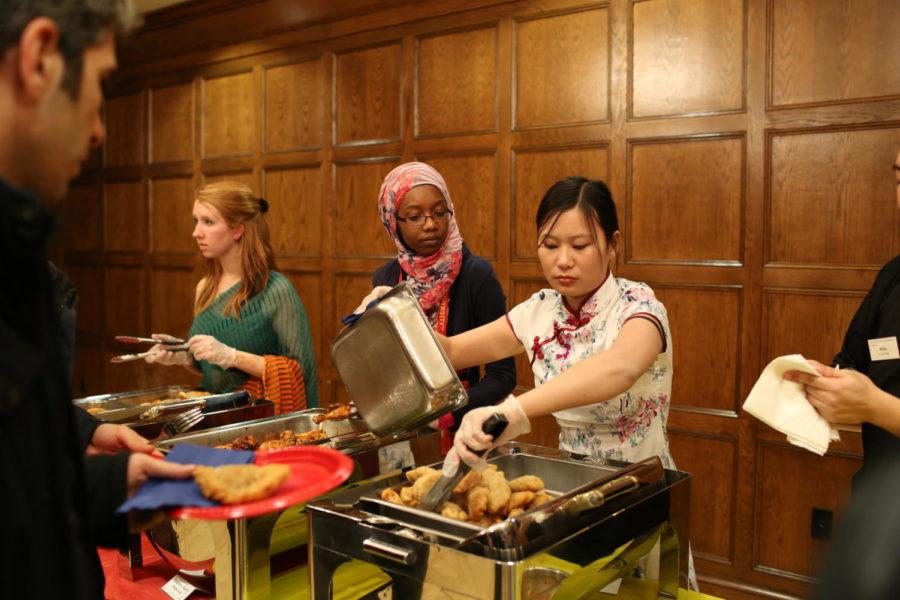Kim: Enhance education through interatctions
Brian Achenbach/Iowa State Daily
Savannah Putnam, junior in biology, Zaynab Diallo, junior in mathematics, and Liuran Fan, graduate student in human development and family studies, served food to a large audience. The food consisted of many culturally diverse selections.
October 5, 2014
The Community Center of Frederiksen Court is often called Korea Town or China Town at ISU among my friends because there are always about 30 Asian students hanging around the Hawthorn Cafe after 8 p.m.
Last week, some of my American friends asked me why Koreans stick together so often and I explained to them that most of them were members of the Korean Students Association, so they were very close to each other. I also heard from my Korean friend that another one of my Korean friends hasn’t made any American friends since the semester began.
Many international students only speak their native language and therefore only mingle with people from their country once they find groups that resemble their native communities, such as the Korean Students Association or the Chinese Students Association. I think it is very unfortunate that these students rarely venture outside of their comfort zone.
There are 45 multicultural students associations at ISU and 17 of them are organizations only for international students. Associations for international students are slightly different from other multicultural students associations since international students mean students from outside of the United States even though they are considered parts of multicultural associations. Hence, most international students don’t have American citizenship and don’t speak English as their first language. Instead of learning a new culture and language by making friends from other countries, they group together for the sake of comfort.
According to a report by the U.S. embassy, about 80,000 Koreans and 260,000 Chinese are studying in America as international students. Most of the international students parents send them to the States in order to make them attend university and learn to speak English fluently.
However, since a lot of international students stick together without getting along with or meeting Americans, their English conversation skills don’t improve quickly or at all. Therefore, they are not able to create opportunities to experience new culture in the States.
Paul Kyungjoon Chung, the international coordinator of ISSO, stated that he used to hang out with Korean friends when he was studying at University of Arizona; before he transferred to ISU, he never had the chance to communicate with people from other native communities, including Americans, and he didn’t improve his English communication skills even though he stayed in the States for more than 5 years.
Now that he has realized the importance of learning different cultures and English, he is trying to stay outside of his comfort zone by making friends outside of Korea.
While the problem may seem relatively innocuous, this leads to a huge issue if those international students decide to find a job in America. For instance, there are a few Korean professors who have bad reputations on “Rate My Professor,” which is a website for students to rate their instructors, because of their poor communication skills with their American students.
On last year’s evaluation, a Korean professor of political sciences, acquired the worst grade; 1.0 out of 5.0 from his students. His poor communication skills being the main reason for his low score. Although he acquired a Ph.D. in the States, one of his students stated that he never spoke proper English, so a few students couldn’t understand the lectures. This indicates the importance of improving communication skills in order to adapt to American society.
Unless international students try to improve their English and understand American culture, it will be very difficult for them to adapt to social life in the States.
I understand international students feel more comfortable when they are within their native communities, but they need to keep in mind that the reason they came to this country is to learn English and American culture by knowing Americans.
I hope more international students will experience a wide variety of events by joining clubs, churches or student organizations instead of joining their native communities. Although staying within native communities can be comfortable, they may realize it was a waste of time once they find out they didn’t learn anything from new people they met in the States.







